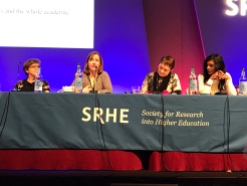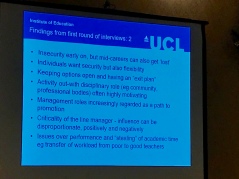
I presented on the first day of the 2018 SRHE Conference in Newport, Wales.
The Society for Research in Higher Education (SRHE) met last week for its 2018 conference. On Day 1, I delivered a summary report on national education policies in relation to what female engineering students told me about school experiences that led them to study engineering.
SRHE is a UK-based organization and its annual meeting is held each December in Wales at the Celtic Manor near Newport, a high-end golf resort where the organization has garnered good deals by assembling mid-week, off-season. The place was decorated beautifully for Christmas and I got a room on the tenth/top floor, with views of the nearby hills. Because I’m a genuine geek, I attended seminars straight through and missed out on the facility’s lovely pool, ice skating rink, and challenge course. Despite missing those thrills, I found the seminars delightful. In this blog, I can’t describe all the fascinating things I learned at the conference, but I’ll share some overarching thoughts and impressions.

View from my tenth-floor room of Celtic Manor.
The opening and closing keynote speeches were very interesting, and they bookended the conference by taking opposite approaches to study international trends in higher education.
Prof. Marek Kwiek delivered the opening keynote. He described how his mixed-methods research study was conducted. He collected over 17k surveys and 500 interviews across 11 European countries, and he identified eye-popping results that did not sit well with some conference attendees. Essentially, top earners in higher education in Europe are more research-oriented, they publish much more than other academics but they also work quite hard, spending more time than others on *all* aspects of academic work–including teaching, research, service, and administration. This goes against commonly held beliefs, and prior research, that suggests researchers successfully avoid work other than research.
Prof. Kwiek said the top 10% of researchers produce 50% of all journal articles.
Prof. Kwiek found that the top 10% of researchers produce 50% of all journal articles. Top-producers work a full two months per year more than most university teachers. They also collaborate with many others internationally when they publish. But what visibly agitated the audience was the demographics Prof. Kwiek identified with regard to these top performers: they are predominantly male, middle-aged, full professors, with a mean age of 47. Being that I’m 48, I am already behind–but more than willing to catch up!
I’m a quick learner, and now I have the code for success. In this case, Prof. Kwiek highlighted an inherent problem: that the variables that mean the most to promotions/progression, salary, and prestige consistently favor men. This is not a problem of Prof. Kwiek’s making, but it is a situation his data clearly showed.

Meeting with my phenomenography mentor, Dr. Mike Miminiris and his US-based friend Marquis Moore.
The other bookend presentation, the closing keynote by Prof. Louise Morley of the Centre for Higher Education and Equity Research in Sussex, would highlight several relevant and important points in response.
One interesting point Prof. Morley raised was that the person who identifies a problem often comes to be seen *as* the problem. Another interesting topic she raised was that bias built into the system of higher education ties to our overall economic-political model called “neo-liberalism” and this makes it nearly impossible to escape. It’s like trying to avoid air. How can we step outside this model to properly credit diverse contributions, when all the measures of performance inherently favor mainstream versions of excellence and productivity?
To help me come to terms with much of this–and excel despite being culturally different–I bought Prof. Kwiek’s book “Changing European Academics: A comparative study of social stratification, work patterns and research productivity.” If you’re interested in the details he presented, you can buy the book. I’ve also included some slides of his presentation directly below, followed by more commentary and photos of other presentations:

An extremely informative panel with Profs. Ellen Hazelkorn and Vikki Boliver and Kalwant Bhopal.
Although I am not a positivist (similar to Prof. Kwiek), I also haven’t adopted the critical perspectives that Prof. Morley uses. I haven’t entirely rejected the neo-liberal framework, and most of my research takes an interpretivist and/or constructivist stance in that I study the status quo prior to suggesting ways to change it. I do incorporate some aspects of critical feminism and critical race theory, but these are underlying principles, not the core paradigm I use.
With regard to neo-liberalism, back during my Ph.D. studies, I really enjoyed the class I had at William and Mary called “Finance of Higher Education.” My teacher, Prof. David Leslie, studied economic trends in USA higher ed and he identified patterns like this. He exampled that in the States, there’s a direct correlation between the discipline you teach in, the pay you’ll receive teaching in that discipline, and how traditionally male- or female-dominated the profession is. This means that in the USA, I can get paid more by teaching in an architecture or engineering department than in an education department. I did look this up and found it shockingly true.

Dr. Maryam Al-Mohammad presenting on “global citizenship” alongside Dr. Neil Harrison, both from UWE.
Fortunately, in European higher ed, the pay grades are less inherently tied to gender. On the whole, there seems to be better pay equity among disciplines in the European academy. Despite the fact that there is more equitable pay for equal work, men still reach the top echelons of higher education management/administration (and research) at much, much higher rates than women. Ireland, for example, is far behind the US where many university and community college (the US equivalent of the Irish IoT) presidents are female.
So, yes, bias regarding gender, ethnicity, physical ability, etc., etc., etc. is still extremely pervasive. Understanding bias, and visualizing why and how it happens, can help us remedy the problems.
So, even though the findings Prof. Kwiek presented were gloomy overall, he did provide me with helpful ideas for accelerating my career. I’ve been trying to break into publishing in a new discipline (I’ve moved from publishing in architecture education and education planning journals to publishing in engineering education) and the findings Prof. Kwiek reported will help me set, and meet, my goals faster. For me, having a road map of what it takes to succeed under current conditions is an important step in moving ahead and I thank Prof. Kwiek for providing such a guidebook.
A later speaker during Day 1 of the conference, Dr. Rachel Handford, noted that “possible selves” “can only include those selves that it is possible to perceive (Stevenson & Clegg, 2011; 233)” meaning that we learn what we might become and consider options before we act, but we need to see examples of possibilities first. I’ve always found this to be true, and I try to expose myself to many different people with different ways of working and seeing the world. They help me figure out what I want to be, learn, do and accomplish. There are photos of Dr. Handford’s presentation below, as well as presentations by Prof. Ming Cheng (on Chinese students studying abroad) and Drs. Cecelia Whitechurch and William Locke (on academic staff members’ techniques for gaining promotion).
I need to wrap up, though I would like to mention other highly-notable moments: three presentations on higher ed in South Africa, one presentation on low-income UK students studying abroad at elite US institutions, a fascinating panel that included Profs. Ellen Hazelkorn and Vikki Boliver and Kalwant Bhopal, a presentation by Drs. Maryam Al-Mohammad and Neil Harrison on “global citizenship”, and talks by historians Prof. John Tyler and Dr. Mike Klasser.
Prof. John Tyler delivered a keynote on the impact of WWI on higher education in Europe and his presentation was insightful. In the US, the aftermath of the Civil War and WWII were turning points for higher education. I’d say the Morrill and Hatch Acts which established the Land Grant institutions in the US mark the birth of the modern university in North America. These facilitated providing higher education to the masses. The federal government became involved in funding higher education. These funds expanded after WWII when our country needed to re-train returning vets and decided to provide money to send them to university. The US government also decided to fund research via universities, as it had worked well for the US to have Harvard run the top-secret Manhattan Project that developed the A-bomb and helped end the war. These are all things I learned in the “History of Higher Education” course I took at Old Dominion University in 2009. At SRHE, Prof. Tyler explained that the dawn of the modern university in the UK came after WWI.
In a paper presentation, Dr. Mike Klassen discussed his research on “the academization of engineering education in the United States and the United Kingdom: A neo-institutional perspective.” Dr. Klassen recently visited UCL (for our recent CEE strategy meeting) but I hadn’t learned what he was studying other than higher ed policy. At SRHE, I got to hear him present on the history of engineering education. I’m hoping that someday he’ll want to study overlaps between engineering and architecture education history and pedagogy development–again comparing North American and European traditions–and that the two of us can work together on this.
I left SRHE having forged many new contacts. I met so many people I’d like to keep in contact with and learned so many new ideas and research findings. I look forward to attending SRHE 2019 and speaking at an SRHE workshop, to be organized by Ann-Marie Bathmaker, in spring 2019.



















































The findings about the extra2 months of work of productive researchers (spent not only on research) are very interesting, and motivating.
I am very glad to hear your thought about Mike Klassen’s talk. We met Mike in Portsmouth at the Uk&IE Annual Symposium on engineering education research, and found his paper (and PhD research) on the politics of accreditation to be excellent (the best i had the chance to listen there). His concern with structural issues underpinning models of eng accreditation are similar in nature to the macro related concern of Eddie’s and mine. We agreed to keep in touch, and maybe to come to DIT for the spring symposium.
(On another note.. 48??? can’t be..)
Cheers
LikeLike
Yes, it was inspiring to hear that working hard, along with full weeks and summer months pays off. Writing over the summer is how I’ve gotten my fellowships and hopefully how I’ll stack up more publications… eventually. Starting when I’m
49!
LikeLike
Wow! All this learning and sharing from one conference! Congratulations, Shannon, you are continuing to excell.
LikeLike
This was just the tip of the iceberg. It was a thought-provoking conference!
LikeLike